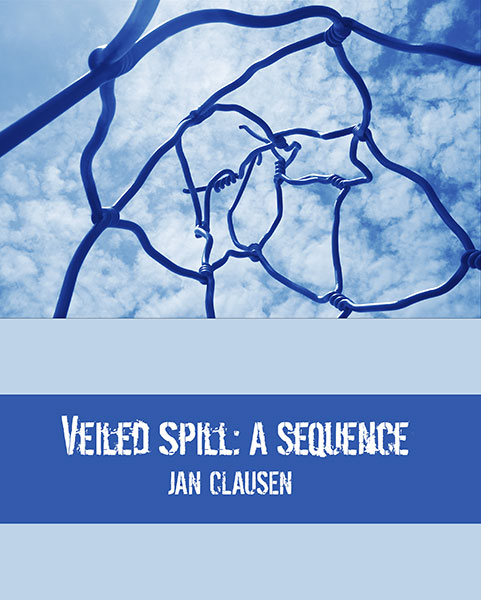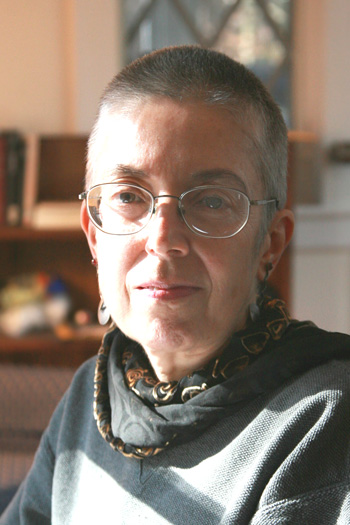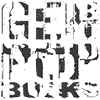
VEILED SPILL: A SEQUENCE
JAN CLAUSEN
GenPop Books
Poetry, 92 pp, trade paperback
ISBN-13: 9780982359471
October 2014
$14.00Add to cart
Begun in response to the Deepwater Horizon oil spill disaster and European laws banning the full face veil, Jan Clausen’s Veiled Spill unfolds a meditation on the links and gaps between interior glimpses and sprawling histories, between the beauty of the moment and the terror of the plot. Bridging poetry and prose, lyric and documentary, sampling and improvisation, it tracks the brooding presence of brittle technologies, the obdurate contingencies of gender and race, the fate of religious questions in the absence of gods, and the desperate freedom of art at a time when conventional social action seems powerless to avert the wreck of the biosphere. Transfixed by the pressure of wildly cascading events that engulf the very possibility of narrative order, the sequence hints, as well, that in a world where “what is veined/is spilling everywhere,” we are already in the revolutionary situation.
PRAISE FOR VEILED SPILL
The veils and spills in Clausen’s book are myriad: Muslim niqabs, toxic overflows of radiation, suppressed desire, information leaking through redacted military documents, the fluidity of gender, sugar—and then poison—left out in the kitchen for ants…. As Clausen’s sequence cartwheels from found and collaged government documents to litanies to homophonic translations, it acknowledges the limitations of such experimentation in the face of environmental and other impending doom: “I can do what I want with form but not for long,” she writes….
—Arielle Greenberg, “What to Read Now — Some Vital Books from 2014,” in American Poetry Review
Below the surface chaos of Clausen’s Veiled Spill lies a complex ecosystem of balanced binaries: between narrative and fragmentation, between spectacle and interiority, between linguistic playfulness and the major social and political issues of our time. Throughout, Clausen invents forms which perfectly place her poems at home on the page, each new structure appearing to arise autonomously and revelatory from its subject matter. Equal parts thoughtful, analytical, and passionate, Veiled Spill welcomes the reader with a handshake and a smack across the face.
—Amy King
Veiled Spill is a work of exquisite, evocative language, and frightening insight. Clausen has created a dire warning to all of us living on this planet of the dangers of extinction of life itself. Yet, somehow at the same time, she offers a lyrical tribute to the power of voices spilling over, breaking out of veils, speaking truth. Then, once again, we are warned — of the dangers of silence, the losses already incurred. I felt haunted by the imagery and musical repetitions, emotionally shaken by a sense of fear and rage at hypocrisies laid bare, the losses to which we are growing dangerously accustomed. Language itself is a metaphor — fractured and torn, then suddenly put back together, veiled and spilled, broken and gathered again. Jan Clausen is a poet I want to listen to and read as closely as I can, to understand, with heart and mind, what she has seen, what we are all faced with.
—Jane Lazarre
Jan Clausen in Veiled Spill writes of complicated vulnerability and feminist resistance and as she does this, she looks for allies and alliances with such a deep love, with such a lyric invocation.
—Juliana Spahr
Excerpts
Poems from Veiled Spill may be found in Poets for Living Waters; Adanna, Women and War Issue; esque #3, Revolution Issue; and On Barcelona.

ABOUT THE AUTHOR
Jan Clausen is the author of a dozen books in a range of genres. Recent poetry collections are From a Glass House and If You Like Difficulty. Prose titles include the story collection Mother, Sister, Daughter, Lover; the novels Sinking, Stealing and The Prosperine Papers; and the memoir Apples and Oranges: My Journey Through Sexual Identity. Clausen’s poetry and creative prose are widely published in journals and anthologies; her book reviews and literary journalism have appeared in Boston Review, Ms., The Nation, Poets & Writers, and The Women’s Review of Books.
